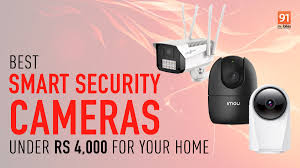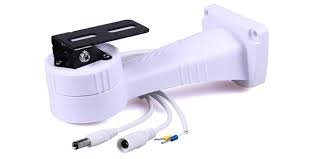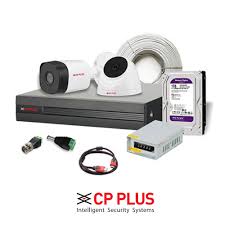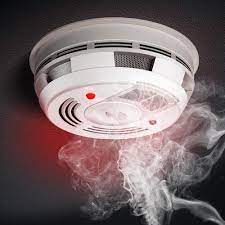When it comes to ensuring the safety and security of your home, investing in a CCTV camera is a wise decision. With the advancements in technology, there are now numerous options available in the market. However, finding the best CCTV camera for your home can be overwhelming. To help you make an informed choice, we have compiled a list of factors to consider and some top recommendations.
Resolution: The resolution of a CCTV camera determines the clarity of the footage it captures. Opt for cameras with at least 1080p Full HD resolution for clear and detailed images.
Night Vision: A good CCTV camera should have excellent night vision capabilities to monitor your property even in low-light conditions. Look for cameras with infrared (IR) LEDs that provide clear images during nighttime.
Field of View: Consider the field of view (FOV) offered by the camera. A wider FOV ensures that more area is covered, reducing blind spots and increasing overall surveillance effectiveness.
Motion Detection: Cameras with motion detection capabilities are highly recommended as they can alert you whenever any movement is detected on your property. This feature helps minimize false alarms and ensures you are notified only when necessary.
Two-Way Audio: Some advanced CCTV cameras come equipped with two-way audio functionality, allowing you to communicate with people on your property remotely via a smartphone app or computer.
Now let’s take a look at some top recommendations for the best CCTV cameras for home use:
Arlo Pro 3: This wireless camera offers 2K HDR video quality, integrated spotlight, color night vision, and a wide 160-degree field of view.
Nest Cam IQ Outdoor: With its 4K sensor and HDR imaging technology, this camera delivers exceptional image quality both day and night. It also features facial recognition capabilities.
Hikvision DS-2CD2143G0-I: Known for its reliability and affordability, this camera offers 4MP resolution, excellent night vision, and a wide range of smart features.
Ring Stick Up Cam Battery: This versatile camera can be used both indoors and outdoors. It offers 1080p HD video, motion detection, two-way audio, and works well with other Ring devices.
Dahua Technology IPC-HDW4433C-A: This camera provides high-quality video footage with its 4MP resolution and has a built-in microphone for audio recording.
Remember to choose a CCTV camera that suits your specific needs and budget. Additionally, consider factors such as weather resistance, storage options (cloud or local), and ease of installation when making your decision.
Installing a CCTV camera not only helps deter potential intruders but also provides you with peace of mind knowing that your home is under constant surveillance. With the right CCTV camera in place, you can ensure the safety and security of your loved ones and belongings.
Top 6 Frequently Asked Questions About the Best CCTV Cameras for Home
- Which camera is better for CCTV?
- How many MP CCTV camera is best for home?
- Which is better CCTV or IP camera?
- Is CCTV good at home?
- How much does 1 CCTV camera cost?
- Which CCTV camera is best for night vision?
Which camera is better for CCTV?
When it comes to determining which camera is better for CCTV, it depends on your specific requirements and the intended use of the camera. Here are a few factors to consider:
- Resolution: Higher resolution cameras, such as those with 1080p Full HD or 4K Ultra HD, offer clearer and more detailed footage. If you need to capture fine details or want to zoom in on recorded footage, a higher resolution camera is recommended.
- Field of View: The field of view (FOV) determines how much area the camera can cover. A wider FOV reduces blind spots and provides better overall surveillance coverage.
- Low-Light Performance: If you require surveillance during nighttime or in low-light conditions, look for cameras with good low-light performance and infrared (IR) LEDs for clear night vision.
- Motion Detection: Cameras with motion detection capabilities can send alerts or trigger recordings when movement is detected within their range. This feature helps minimize false alarms and ensures you are notified only when necessary.
- Weather Resistance: If you plan to install cameras outdoors, make sure they are weather-resistant and designed to withstand various environmental conditions such as rain, snow, or extreme temperatures.
- Storage Options: Consider whether you prefer local storage (such as an SD card) or cloud storage for recorded footage. Each option has its pros and cons in terms of convenience, accessibility, and cost.
- Budget: Set a budget for your CCTV camera system and look for options that provide the best value within your price range.
Ultimately, the best camera for CCTV will depend on your specific needs and preferences. It’s recommended to research different brands and models, read reviews from reputable sources, and consult with professionals if necessary to ensure you choose a camera that meets your requirements in terms of image quality, reliability, features, and budget constraints.
How many MP CCTV camera is best for home?
When it comes to choosing the best megapixel (MP) CCTV camera for your home, there are a few factors to consider. The resolution of the camera plays a crucial role in determining the clarity and level of detail in the footage it captures.
For most home security needs, a CCTV camera with a resolution of 2 to 4 megapixels (MP) is considered sufficient. Cameras within this range provide clear and detailed images that allow you to identify faces, objects, and other important details with ease.
A 2MP camera offers a resolution of 1920 x 1080 pixels, commonly known as Full HD. This resolution is suitable for general surveillance purposes and provides good image quality for most home environments.
If you desire even higher image quality, you can consider opting for a 4MP camera. These cameras offer a resolution of 2560 x 1440 pixels, also known as Quad HD or 2K resolution. A higher resolution allows for more detailed footage and may be beneficial if you need to closely monitor specific areas or require enhanced clarity.
It’s worth noting that while higher-resolution cameras can capture more detail, they may also require more storage space to store the recorded footage. Therefore, it’s important to consider your storage capabilities when selecting a CCTV camera.
Ultimately, the choice between a 2MP or 4MP CCTV camera depends on your specific needs and preferences. Assessing factors such as the size of your property, desired level of detail in captured footage, and available storage capacity will help guide you towards selecting the best MP CCTV camera for your home.
Which is better CCTV or IP camera?
When it comes to choosing between CCTV (Closed Circuit Television) cameras and IP (Internet Protocol) cameras, there are a few factors to consider. Both types of cameras have their own advantages and it ultimately depends on your specific requirements and preferences.
CCTV Cameras:
Analog Technology: CCTV cameras use analog technology to transmit video signals to a recording device or monitor. They are typically connected via coaxial cables or wireless transmitters.
Cost-effective: CCTV cameras are generally more affordable compared to IP cameras, making them a popular choice for budget-conscious individuals.
Simplicity: They are relatively easy to install and operate, making them suitable for those who prefer a straightforward setup.
Local Storage: CCTV systems usually store video footage locally on DVRs (Digital Video Recorders) or NVRs (Network Video Recorders), which can be convenient if you have limited internet bandwidth or concerns about data privacy.
IP Cameras:
Digital Technology: IP cameras use digital technology to capture and transmit video data over an IP network, such as the internet or local network.
Higher Resolution: IP cameras generally offer higher resolution options, including Full HD (1080p) and even 4K Ultra HD, resulting in clearer and more detailed images.
Remote Access and Monitoring: With IP cameras, you can access live feeds and recorded footage remotely from any device with an internet connection, providing flexibility and convenience.
Advanced Features: IP cameras often come with advanced features like motion detection, facial recognition, PTZ (Pan-Tilt-Zoom), and two-way audio capabilities.
Scalability: IP camera systems can be easily expanded by adding more cameras to the network without requiring significant infrastructure changes.
It’s important to note that both types of cameras can provide effective surveillance solutions depending on your needs. If you have a tight budget or prefer a simple setup with local storage options, CCTV cameras might be a suitable choice. On the other hand, if you prioritize higher resolution, remote access, and advanced features, IP cameras are worth considering.
Ultimately, it’s recommended to assess your specific requirements, budget constraints, and long-term goals before making a decision. Consulting with a security professional can also provide valuable insights tailored to your specific situation.
Is CCTV good at home?
Yes, CCTV (Closed Circuit Television) cameras are highly beneficial for home security. Here are some reasons why CCTV cameras are good for homes:
- Deterrence: The presence of visible CCTV cameras acts as a deterrent to potential burglars and intruders. Knowing that their actions are being recorded increases the risk of being caught, which can discourage criminal activity.
- Surveillance: CCTV cameras provide continuous monitoring of your property, allowing you to keep an eye on activities in and around your home. This surveillance capability helps identify any suspicious behavior or unauthorized individuals.
- Evidence: In the unfortunate event of a break-in or other criminal activity, CCTV footage can serve as valuable evidence for law enforcement agencies. High-quality recordings can help identify perpetrators and increase the chances of apprehending them.
- Remote Monitoring: Many modern CCTV systems offer remote viewing capabilities through smartphone apps or computer software. This allows homeowners to monitor their property in real-time from anywhere, providing peace of mind and enabling immediate action if necessary.
- Safety: CCTV cameras not only protect against external threats but also enhance the safety of residents within the home. They allow you to monitor children playing in the backyard, keep an eye on elderly family members, or ensure the safety of pets.
- Insurance Benefits: Installing CCTV cameras may lead to reduced insurance premiums for your home insurance policy. Insurance companies often offer discounts for homes equipped with security systems as they lower the risk of theft and damage.
- Documentation: Apart from security purposes, CCTV cameras can be helpful in documenting everyday incidents such as accidents, property damage, or interactions with service providers. This documentation can be useful for resolving disputes or clarifying events if needed.
It is important to note that while CCTV cameras provide numerous benefits for home security, it is essential to comply with local laws and regulations regarding their use to respect privacy rights and ensure legal compliance.
Overall, investing in a well-planned and properly installed CCTV system can significantly enhance the security and safety of your home, providing you with peace of mind and protection for your loved ones and belongings.
How much does 1 CCTV camera cost?
The cost of a CCTV camera can vary depending on several factors, including the brand, features, resolution, and additional functionalities. On average, a basic CCTV camera can range from INR 1,500 to INR 5,000. These cameras usually offer standard features such as decent resolution and basic night vision capabilities.
For higher-quality cameras with better resolution (HD or Full HD), enhanced night vision, motion detection, two-way audio, and other advanced features, the price can range from INR 5,000 to INR 20,000 or more per camera.
It’s important to note that the cost mentioned here is just an estimated range and may vary based on your location and specific requirements. Additionally, if you opt for professional installation services or additional accessories like storage devices or cables, it may incur additional costs.
When considering purchasing a CCTV camera for your home or business, it’s advisable to research different brands and models to find the best balance between price and features that meet your security needs.
Which CCTV camera is best for night vision?
When it comes to CCTV cameras with excellent night vision capabilities, there are a few top contenders in the market. Here are some of the best options:
- Arlo Pro 3: This wireless camera offers color night vision, thanks to its integrated spotlight and ambient light sensors. It provides clear and detailed images even in low-light conditions.
- Nest Cam IQ Outdoor: With its 4K sensor and HDR imaging technology, this camera delivers exceptional image quality during the day and impressive night vision performance. It captures clear footage even in complete darkness.
- Hikvision DS-2CD2143G0-I: Known for its reliability, this camera offers excellent night vision with its built-in IR LEDs. It provides detailed black and white images in low-light environments.
- Ring Stick Up Cam Battery: This versatile camera features infrared night vision, allowing it to capture clear footage at night. It provides reliable surveillance even in complete darkness.
- Dahua Technology IPC-HDW4433C-A: This camera offers impressive night vision capabilities with its built-in IR LEDs. It captures detailed black and white images in low-light conditions.
These cameras utilize advanced technologies such as infrared (IR) LEDs or ambient light sensors to enhance their night vision performance. However, it’s important to consider other factors such as resolution, field of view, and additional features when choosing the best CCTV camera for your specific needs.




